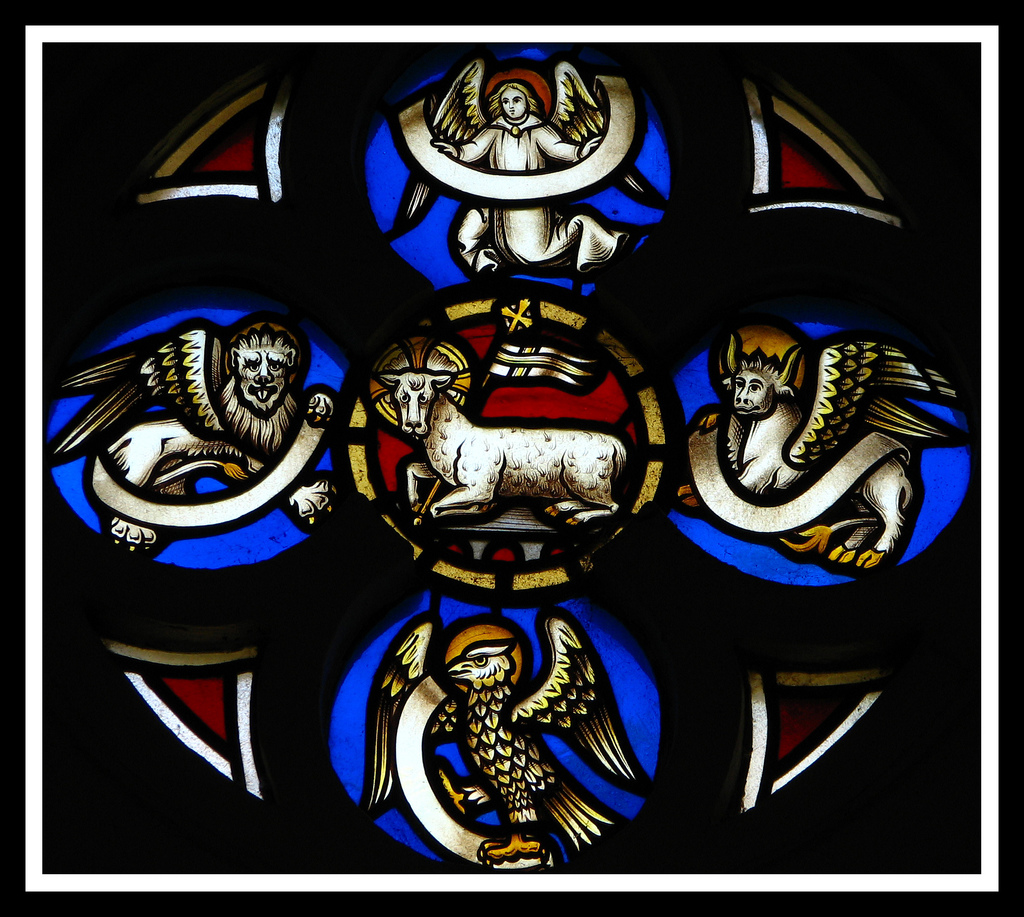In the church, we view St. Luke as an Ox.
What do oxen do? In the time before mechanized farming and agriculture, something was going to have to pull the plow, something was going to have to do all the hard work of hauling, pulling, and tirelessly treading out what had to be trodden. In those days, it was oxen that did that work. Think of Babe, the big blue ox, a creature of such size and strength that it is legendary. The tireless workhorse companion of Paul Bunyan, the legendary woodsman of American folklore.
Now, Paul Bunyan is uniquely American, one of those tales that was born from effort, work, and the clearing and taming of the American continent, and his story doesn't exist in other parts of the world. Truly a new world creation. But Paul Bunyan, though he was larger than life, could clear trees and strap hams to his feet, doing all that stuff, could not have accomplished what he accomplished without the presence of Babe. His companion. The one who pulls his load for him.
Babe, in many ways, is seen every bit as otherworldly in his abilities as Paul Bunyan, you know. Babe isn't a regular ox who is bound by normal limitations. Rather, Babe is otherworldly in appearance, as well as in attributes. He's enormous, powerful, and blue, to indicate just how outside of the normal ox experience we're talking about. What I do want you to remember, though, and to ruminate on as we move forward, is that Babe is crucial to the Paul Bunyan story.
In the story of the Bible, no book is about Luke. No book, not even scenes in books are about Luke. Even though Luke himself transcribes and writes down an awful lot of what we would deem to be absolutely vital information, he doesn't tell his own story at all. Rather, he is there to tell an intensely important story, and to pass that information down through the centuries. He is there to let people know who this Jesus is, but unlike the other Gospel writers, he doesn't stop there. Rather, Luke's story continues, to the time of the church. Luke shepherds them through a difficult time in discerning who they are after the time of Christ. Luke documents the change in the church from being a Jewish sect to being a true global religion, with adherents all over the known world. And it is Luke who shows you the first gentile converts, and the rift and healing that they brought to the faith. Luke's Gospel has Jesus telling his followers to take the faith to the ends of the earth beginning from Jerusalem, and in the Acts of the Apostles, also penned by Luke, we get to see what that looks like.
Paul's missionary journeys, imprisonments, times in jail, shipwrecks, are all catalogued by Luke as well, who tells you about where Paul went, so that his letters that he writes to the churches may seem all the more sincere and real, from a real person in a real time and place. Through Luke's words, you can hear about the effort, the risk that Paul took, you can see the changes in Paul happening over time, so that when you read Paul's letters, you can see a fully fleshed out individual, from the outside as well as from his own perspectives. In fact, Luke's account of the work of the apostles is so crucial that it is essentially required reading for anyone who would venture into the letters of Paul. You should know who this man is and where he went in order for his letters to matter to you.
Here's a fun exercise. If you're in the grocery store, and you have your shopping list, it is of infinite importance to you, because it tells you all the things that you need at home. But if you're in the grocery store, and you find someone else's shopping list, it is of no value whatsoever, given that these aren't things you need at home. Now, they may be similar, and may have some of the same things on them, but without it being connected to you in some appreciable way, it's a fun look into someone else's life. That's all. You see, the letters that are written to Rome, to Corinth, to Thessalonica, all these letters take on a much more human component because you and I have voyaged with Paul through his journeys. We've seen him move from being an ardent persecutor of the church to its strongest advocate. We've seen him leave his former life behind, and take on a new name, and a new identity. When his letters reflect this, we nod along, because we've seen this happen. We've seen Paul do this, have come to know him through Luke, so when Paul writes of himself, we have seen it all happen, and appreciate it all the more.
But the books aren't about Luke. Luke just makes them happen. He takes down the information, compiles it, presents it, and sticks with Paul all the way. Luke isn't at the center of the story, far from it. But he is the reason that you know it the way you do. And this is where I get back to Paul Bunyan.
In the iconography of the church, Luke is seen as the hardworking Ox. The one who pulls the load, who gets the job done. Paul Bunyan cuts down the trees, but Babe pulls them away. Paul is doing the work of the evangelist to the nations, difficult, dangerous work, but who is it who completes his evangelism, not just to those people at the time, but to you through the centuries?. That's Luke. What Christ and Paul do, Luke records, transcribes, writes down and complies, so that you may not know Luke's story, but that you may know theirs. And it worked. It worked brilliantly.
The holy scriptures would be so much poorer without the work of Luke. In fact, the Christian faith may very well have been completely different without him. For all we know, without hearing of Cornelius, or of Pentecost, or of the Ethiopian eunuch, the Christian faith may have remained a Jewish sect. But it didn't. Christ never intended for it to be, and Luke tells you how that happened. The work of the steadfast, unflappable, sturdy and hardworking Luke, laboring to bring us what Paul and Christ have produced.


No comments:
Post a Comment